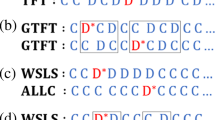Summary
We examine the necessary conditions for the spread of genes that determine ‘selfish’ and ‘cheating’ behaviors and the rate of spread of these genes through structured populations, in order to address the question of the invadability of altruistic systems by ‘anti-social’ mutations. We find that, although ‘cheaters’ always have a higher relative fitness than altruists within groups, population structures which permit the evolution of altruism also preclude invasion by anti-social mutations. These results are related to a discussion by Hamilton (1971) concerning the limits to the evolution of altruistic and selfish behaviors.
Similar content being viewed by others
References
Alexander RD (1974) The evolution of social behaviors. Annu Rev Ecol Syst 5:325–383
Barash D (1979) The whisperings within. Harper and Row, New York
Cavalli-Sforza LL, Feldman M (1978) Darwinian selection and ‘altruism’. Theor Popul Biol 14:268–281
Charlesworth B (1978) Some models of the evolution of altruistic behavior between siblings. J Theor Biol 72:297–319
Charnov E (1977) An elementary treatment of the genetical theory of kin-selection. J Theor Biol 66:541–550
Dawkins R (1976) The selfish gene. Oxford University Press, Oxford
Haldane JBS (1932) The causes of evolution. Cornell University Press, New York
Hamilton WD (1971) Selection of selfish and altruistic behavior in some extreme models. In: Eisenberg JF, Dillon WS (eds) Man and beast: comparative social behavior. Smithsonian Institution Press, Washington DC, pp 57–91
Levitt PR (1975) General kin selection models for genetic evolution of sib altruism in diploid and haploid species. Proc Natl Acad Sci USA 72:4531–4535
Maynard Smith J (1964) Group selection and kin selection. Nature 201:1145–1147
Michod R (to be published) Genetical aspects of kin selection: effects of inbreeding. J Theor Biol
Trivers RL (1971) The evolution of reciprocal altruism. Q Rev Biol 46:35–57
Wade MJ (1978a) Kin selection: a classical approach and a general solution. Proc Natl Acad Sci USA 75:6153–6158
Wade MJ (1978b) A critical review of the models of group selection. Q Rev Biol 53:101–114
Wade MJ (1979) The evolution of social interactions by family selection. Am Nat 113:399–417
Williams GC, Williams DC (1957) Natural selection of individually harmful social adaptations among sibs with special reference to social insects. Evolution 11:32–39
Wilson DS (1975) A general theory of group selection. Proc Natl Acad Sci USA 72:143–146
Wilson DS (1977) Structured demes and the evolution of group-advantageous traits. Am Nat 111:157–185
Author information
Authors and Affiliations
Rights and permissions
About this article
Cite this article
Wade, M.J., Breden, F. The evolution of cheating and selfish behavior. Behav Ecol Sociobiol 7, 167–172 (1980). https://doi.org/10.1007/BF00299360
Received:
Accepted:
Issue Date:
DOI: https://doi.org/10.1007/BF00299360




